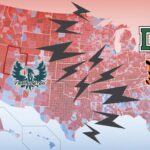When President Donald Trump called Samantha Fuentes, a survivor of the Parkland Shooting in her hospital bed, he repeatedly told her that the shooter was “one sick puppy.” His public address in regard to the attack of Stoneman Douglas High School consisted solely of a promise to “tackle the difficult issue of mental health.”
NRA Spokeswoman Dana Loesch said on CNN that “the NRA does not support people who are crazy, who are a danger to themselves getting their hands on firearms,” going on to call shooter Nikolas Cruz an “insane monster.”
No one mentioned the fact that after 290 school shootings in the past five years, Cruz was able to legally purchase an AR-15 automatic assault rifle, sailing through Florida’s scant background checks despite the homicidal red flags that every one of his classmates and teachers said he exhibited. It begs the question: Is the mass shooting epidemic in America really just a mental health issue?
The recent rhetoric —based in long-held cultural stigma—of using mental illness as the scapegoat for gun violence is the excuse many of America’s politicians rely on in place of proposing gun control legislation. Already a stigmatized topic, mental health is an easy way for members of the Trump administration to draw attention away from the obvious loopholes in gun safety that they refuse to address. Further, targeting a population that is the victim of many cultural taboos does very little to alleviate a) gun violence, or b) prejudice against Americans dealing with mental illness.
There is increasing evidence that psychiatric diagnosis cannot predict violent behavior, although 34 states require gun crime predictions from psychiatrists treating mentally ill individuals. The misconception that violence is solely perpetrated by people with mental disorders is largely due to the media’s shifting definition of what it means to be mentally ill — aggressive, gun obsessed, homicidal. Rather than citing actual medical evidence, the media uses mental illness as the immediate “diagnosis” of someone who committed an act of violence. Dr. Joe Belanoff, CEO and co-founder of Corcept Therapeutics, a strong advocate against the argument that mental illnesses is the root cause of gun violence, says of the issue, “I think the collateral damage to it is that once again people who have psychiatric issues feel diminished relative to people in general, and are less likely to go for care when they have a problem.”
In reality, pointing to mental illnesses as the cause of mass shootings actually causes many patients to withdraw from society, not violently attack it, as is touted by the media. Instead of tasking psychiatrists with the job of identifying possible shooters, a study called “Mental Illness, Mass Shootings, and the Politics of American Firearms” in the American Journal of Public Health suggests that a better use of their time may be exploring the American culture that makes guns so commonplace and why so many criminals (mainly young, isolated males) have felt the need to commit mass shootings in order to prove their power and masculinity. Along with a definite need for a change in gun safety laws, the idea is that legislation in addition to cultural change will prompt a decrease in American gun violence.
The common connection between mental illness and gun violence is a product of gross oversimplification of the issue by senators, administration, and media alike. Although mass shootings are far more frequent than they should be, evidence that the majority of shooters are mentally ill remains largely anecdotal. The facts that we do have strongly suggest that our country’s issues with gun violence run parallel to, rather than stem from, the mental illness epidemic. “Fewer than five percent of the 120,000 gun-related killings in the United States between 2001 and 2010 were perpetrated by people diagnosed with mental illness,” says Dr. Paul Appelbaum, a Columbia University psychologist who studies the correlation between mental disorders and violence.
By targeting those with mental health issues as the sole cause of gun violence, public attention is taken off of the government officials who refuse to reform our current gun safety legislation that allows pedestrian access to military-grade firearms. As the emotional toll of the hundreds of shootings stack up, and movements such as the #NeverAgain campaign push the Trump administration to buckle down on reforms, it is easy to see why the government would be trying to redirect the blame onto a more vulnerable population. By validating the assumption that all mass shooters obtain their guns illegally through backdoor sources, officials are able to push the rhetoric that “people will get guns no matter what,” therefore moving the focus from limiting gun purchases on to the individual perpetrators. Although this effectively voids their own agendas from responsibility in the issue, it neglects to take into account that 60 percent of mass shooters’ weapons have been legally obtained in the U.S.
As Belanoff put it, “If this was 50 years ago, before assault weapons, a kid like that, who was clearly extremely troubled, would have come back that night and thrown rocks through the window [of the school]. But now a guy like that can own a gun legally and kill twenty people.”




